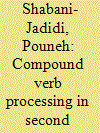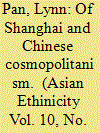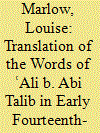| Srl | Item |
| 1 |
ID:
143589


|
|
|
|
|
| Summary/Abstract |
This study investigates compound verb processing in second language speakers (L2) of Persian. Forty-six near-native L2 speakers of Persian were tested to examine the processing of transparent (non-idiomatic) and opaque (idiomatic) compound verbs, under masked priming paradigm. The results revealed a significant nominal priming effect in the opaque condition, and a numerically stronger nominal priming effect in the transparent condition. There was also an increase in the processing load on the parser when the target was an opaque compound. The results of this study seem to be compatible with the dual access or dual route hypothesis, yet with the version that assumes the two routes are activated in parallel rather than the version that assumes high frequency words are represented lexically but low frequency words are decomposed.
|
|
|
|
|
|
|
|
|
|
|
|
|
|
|
|
| 2 |
ID:
143151


|
|
|
|
|
| Summary/Abstract |
ALTHOUGH APPROXIMATELY TWO-THIRDS OF the Latino electorate in the United States is Spanish speaking (bilingual or Spanish dominant),1 the independent impact of this demographic characteristic on voting and on participation in nonvoting campaign-related activities has been ignored by analysts and political activists alike. The objective of this article is to contribute to filling this void. Specifically, the article theorizes that non-English-dominant Latinos (bilingual and Spanish dominant) have access to Spanish-language media and social environments that make them more and differently informed about the U.S. political world than English-dominant Latinos. We use multivariate analytic techniques to measure the independent impact of language competence and find that the results of our analysis largely support our initial predictions. That is, we show that bilinguals and Spanish-dominant Latinos register and vote at rates equal to or higher than English-dominant Latinos or monolinguals who have access to resources that the major models of electoral behavior find predict high levels of political involvement.2 We also find that bilinguals participate in nonelectoral campaign activities at rates comparable to English-dominant Latinos.
|
|
|
|
|
|
|
|
|
|
|
|
|
|
|
|
| 3 |
ID:
093961


|
|
|
|
|
| Publication |
2009.
|
| Summary/Abstract |
Starting with the 2005 Chinese Heritage Centre exhibition 'Chinese More or Less' (for which I wrote the storyboard) - specifically with that part of the exhibition that profiles diasporic Chinese exemplars of different ways of combining cosmopolitanism with Chineseness - this paper attempts to respond to questions raised by Anthony Reid, viz: whether my moving from diaspora to Shanghai comes of 'Shanghai (re)joining the diasporic sense of Chinese modernity and post-modernity'; whether 'the diaspora no longer seems quite so distinctive once China is again an open and cosmopolitan place'; and whether I am still a 'Chinese Overseas' when I live in Shanghai.
|
|
|
|
|
|
|
|
|
|
|
|
|
|
|
|
| 4 |
ID:
177049


|
|
|
|
|
| Summary/Abstract |
The late Ilkhanid period saw a florescence of intellectual and cultural production in northwestern and west-central Iran. This article argues that a regional network with its center at Isfahan contributed to this creativity through the production of translation-adaptations between Arabic and Persian. In a period of episodic sectarian tensions, especially in the wake of Öljeytü’s efforts to declare Twelver Shiʿism the official religion of parts of ʿIraq-e ʿAjam, this local network produced a set of five bilingual treatments of parts of the literary legacy of ʿAli b. Abi Tālib (d. 40/661). The article argues that the authors and copyists of these texts sought, through their focus on the figure of ʿAli and their exploration of the ambiguities facilitated by bilingual composition, to expand a non-sectarian middle-ground.
|
|
|
|
|
|
|
|
|
|
|
|
|
|
|
|
| 5 |
ID:
127035


|
|
|
|
|
| Publication |
2013.
|
| Summary/Abstract |
This article discusses the experience of Arabic-Hebrew bilingual schools in Israel through the lens of four documentaries. It investigates Zionism's view and understanding of bi-national and bilingual education based on the stories of the documentaries, and on background information received through interviews with the film-directors and school principals. I argue that the materials shown in the documentaries could serve as evidence that even in a bi-national and bilingual educational setting, the hegemony of the majority ethnic group is present and felt. The cinematic choices reflect repetition of specific tropes (e.g. how national holidays are celebrated, creating 'balance' between representations of Palestinian and Jewish suffering) but remain silent about the linguistic challenges and the remaining inequality.
|
|
|
|
|
|
|
|
|
|
|
|
|
|
|
|